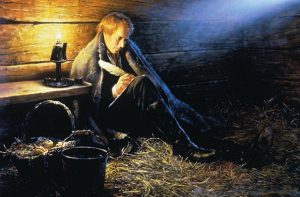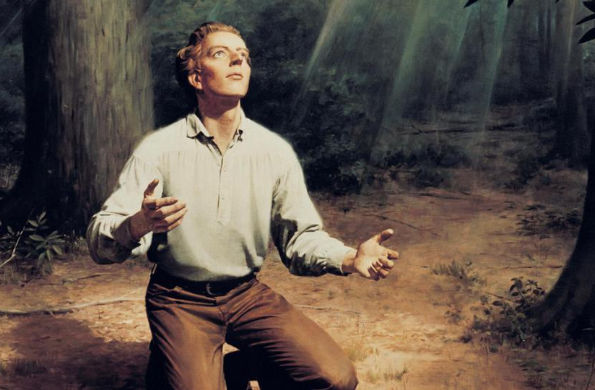I connect with the words of the prophet Joseph Smith. That may not surprise you, but what I am referring to may surprise you. My reference is to his statement about the struggle of feeling alone and abandoned by friends and church leaders that criticized him for speaking the truth — even when it was difficult to do so.
 What I like to think is that Joseph’s experience and statement of fact helps me when faced with similar criticism for speaking what I believe. Every missionary knows this struggle. The finger of scorn does not only appear in Lehi’s dream: we see it every day, whether it comes from our adversaries and critics, our friends and associates, or even from family members that see things differently.
What I like to think is that Joseph’s experience and statement of fact helps me when faced with similar criticism for speaking what I believe. Every missionary knows this struggle. The finger of scorn does not only appear in Lehi’s dream: we see it every day, whether it comes from our adversaries and critics, our friends and associates, or even from family members that see things differently.
At times like this, we may ask why?
So it was with me. I had actually seen a light, and in the midst of that light I saw two Personages, and they did in reality speak to me; and though I was hated and persecuted for saying that I had seen a vision, yet it was true; and while they were persecuting me, reviling me, and speaking all manner of evil against me falsely for so saying, I was led to say in my heart: Why persecute me for telling the truth? I have actually seen a vision; and who am I that I can withstand God, or why does the world think to make me deny what I have actually seen? For I had seen a vision; I knew it, and I knew that God knew it, and I could not deny it, neither dared I do it; at least I knew that by so doing I would offend God, and come under condemnation.
Now I am not saying that my understanding is anything like Joseph’s experience. That unique occasion and struggle was exceptional in the millennia of time as the gospel was ushered into its rightful place. But the sentiments are the same. “Why persecute me for telling the truth?” Right or wrong, I have the courage to speak my mind and share my point of view. How can one be criticized for having the guts to stand up regardless of the rejection or ridicule? The eleventh article of faith seems appropriate to that point:
“We claim the privilege of worshiping Almighty God according to the dictates of our own conscience, and allow all men the same privilege, let them worship how, where, or what they may” (emphasis added).
We believe all men have the right to their individual beliefs. The United States was founded on that principle as well. The first amendment to the US Constitution guarantees that freedom and states, “Congress shall make no law respecting an establishment of religion, or prohibiting the free exercise thereof.” The Constitution did not create a nation, nor its religion and institutions, but the early settlers were willing to fight to their death to preserve that right for us. Hand-to-hand combat in those days must have been ruthless, but they were willing to engage in the struggle for the rights that we so easily take for granted today.
In my opinion, one of the greatest pieces of literature ever composed was written by the sixteenth president of the United States, Abraham Lincoln, when he led this country through perhaps one of the greatest struggles for freedom the United States of America has ever known. As a result, one of the most memorable and powerful speeches in our history was born 156 years ago this month, weighing in at just under 300 words:
Four score and seven years ago our fathers brought forth on this continent, a new nation, conceived in Liberty, and dedicated to the proposition that all men are created equal.
Now we are engaged in a great civil war, testing whether that nation, or any nation so conceived and so dedicated, can long endure. We are met on a great battle-field of that war. We have come to dedicate a portion of that field, as a final resting place for those who here gave their lives that that nation might live. It is altogether fitting and proper that we should do this.
But, in a larger sense, we cannot dedicate — we cannot consecrate — we cannot hallow — this ground. The brave men, living and dead, who struggled here, have consecrated it, far above our poor power to add or detract. The world will little note, nor long remember what we say here, but it can never forget what they did here. It is for us the living, rather, to be dedicated here to the unfinished work which they who fought here have thus far so nobly advanced. It is rather for us to be here dedicated to the great task remaining before us — that from these honored dead we take increased devotion to that cause for which they gave the last full measure of devotion — that we here highly resolve that these dead shall not have died in vain — that this nation, under God, shall have a new birth of freedom — and that government of the people, by the people, for the people, shall not perish from the earth.
Gettysburg Address
November 19, 1863

To read more of Walter’s articles, click here.
Those 272 immortal words articulate the very struggle that continues today. We are still fighting the same battle for truth that commenced in the pre-existence and continues in earnest in our day.
Yet will we remain silent or stand up with courage and speak the truth even when faced with struggle?
In the article “Stand Up, Speak Up, and Shine,” Primary president Joy D. Jones shares a quote we should all commit to memory:
It might help to remember the wisdom of Elder Jeffrey R. Holland: “You will one day find yourself called upon to defend your faith or perhaps even endure some personal abuse simply because you are a member of The Church of Jesus Christ of Latter-day Saints. Such moments will require both courage and courtesy on your part.”
Speaking up isn’t easy. Did everyone agree with the Savior as He taught His seemingly new doctrine to the Jews? Of course not. Did He tolerate the sins of His day that we see so rampant before us today? No, He did not stay silent. He was bold in His proclamations because He knew He was doing His Father’s will. Not everyone agreed with what He taught, but He stood for the truth. He had enemies, but He loved them and always treated others with kindness. His example stands supreme.
Always we speak by virtue of our example—often more powerfully than the words that we express. To paraphrase one of my favorite writers, Ralph Waldo Emerson, your actions speak so loudly that others cannot hear what you are saying.
Everything we do—all our actions—suggests where our loyalties really lie.
You don’t have to call down fire from heaven like Elijah or part the Red Sea like Moses. What you do to show your mettle is keep your promises and show up, stand up, and speak up.
Forever.
About Walter Penning
In 1989, Walter Penning formed a consultancy based in Salt Lake City and empowered his clients by streamlining processes and building a loyal, lifetime customer base with great customer service. His true passion is found in his family. He says the best decision he ever made was to marry his sweetheart and have children. The wonderful family she has given him and her constant love, support, and patience amid life's challenges is his panacea.
Twitter •






